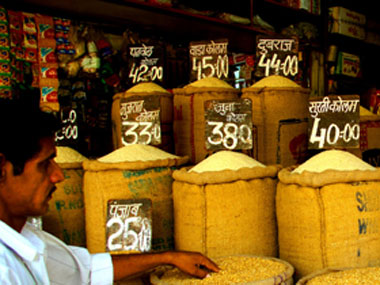Category: Global Economy Sub-category: Indian Economy
Document type: news
Overriding a few recommendations of the National Advisory Council (NAC), an empowered group of ministers (eGoM) sanctioned the draft Food Security Bill, which has proposed a legal right for subsidised grain to three fourth of rural families and half of urban households.
It had earlier been recommended by the NAC that cheap grain should be provided as a matter of right to 90% of the country's rural households and 50% of urban households.
However, the prioritization of households has been kept constant at 46% of the country's rural population and 28% of the urban population. According to officials, 68% of the country's total population of 1.2 billion shall obtain legal entitlement for grains after the bill shall come into force. The target coincides with current coverage under the targeted public distribution system.
Flaunted as the second most important legislation of the United Progressive Alliance after the Mahatma Gandhi National Rural Employment Guarantee Scheme, the draft bill will undergo inspection by the law ministry prior to being presented in front of the Cabinet.
 The bill will also be presented before the food ministry prior being presented in front of the Parliament. In fact, there was general agreement on the draft food bill prepared by the food ministry and it was endorsed by all the members in the eGoM.
The bill will also be presented before the food ministry prior being presented in front of the Parliament. In fact, there was general agreement on the draft food bill prepared by the food ministry and it was endorsed by all the members in the eGoM.
According to officials, upon the enactment of the bill, the nation would need to boost yearly grain procurement to around 61 million tonnes. At present, average annual grain procurement is 55-60 million tonnes.
It has been decided that the priority category household, or the below poverty line (BPL) families, will be given 7 kg of grain per person per month, while general category households (above poverty line families) will be provided 3 to 4 kg of grain per person per month. Rice will be given to priority-sector households at Rs 3 per kg, wheat at Rs 2 per kg and coarse cereals at Rs 1 per kg. For the general category households, grains will be supplied at a price allied to the minimum support price. The country's food bill is ascertained to rise to around Rs 94,987 crore after enactment, comprising an additional outflow of almost Rs 13,000 crore annually.
Export of a million tonnes of non-basmati rice has been sanctioned by the eGom due to overflowing stocks. A decision has been reached upon to an 'in-principle' approval to the export of wheat. For wheat, the quantity and timeframe will be decided at a later stage, after taking into consideration the situation in the international grain market.
After the local market prices of rice and wheat had rocketed in 2007 and 2008, India had banned wheat and rice exports However, there has been a growing urgency for allowance of exports as grain stocks maintained by the Center have swollen to over 65 million tonnes, while storage space with Food Corporation of India (FCI) and state agencies does not exceed 63 million tonnes.
An export of 300,000 tonnes of rice to Bangladesh and another 500,000 tonnes of rice through other countries on a government-to-government basis has been agreed upon, after consultation with the foreign ministry and diplomatic routes.
External Links:
National Rural Employment Guarantee Scheme - Official Website - The Mahatma Gandhi National Rural Employment Guarantee Act aims at enhancing the livelihood security of people in rural areas by guaranteeing hundred days of wage-employment in a financial year to a rural household whose adult members volunteer to do unskilled manual work.
National Advisory Council, India (NAC) - Official Website
Below Poverty Line is an economic benchmark and poverty threshold used by the government of India to indicate economic disadvantage and to identify individuals and households in need of government assistance and aid. It is determined using various parameters which vary from state to state and within states. The present criteria are based on a survey conducted in 2002. Going into a survey due for a decade, India's central government is undecided on criteria to identify families below poverty line.
-









